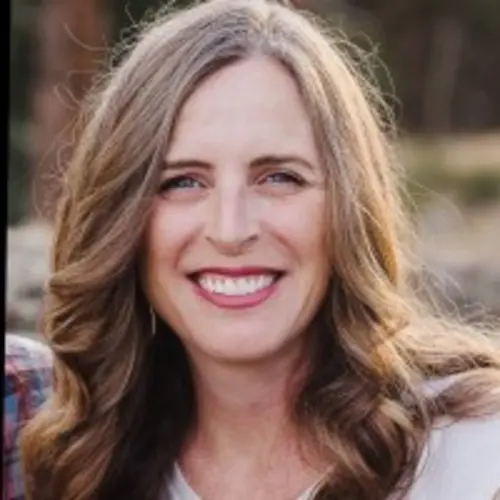Image by Edyta Pawlowska via Depositphotos
Rebecca H. had multiple specialties over her 15-year nursing career. She worked in the ER, oncology, telehealth case management, and hospice, to name a few.
She was often required to work grueling, back-to-back 12-hour shifts. She remembers that stressful time. “In nursing, you never sit down. Half the time, you don’t get to eat. You’re supposed to get breaks, but you’re always helping other nurses and putting out fires, so you don’t always get them.”
On her worst days, Rebecca would cry in the car on the way home, physically, mentally, and emotionally exhausted. She felt like she was always in crisis mode – an untenable position for the mom of five and primary breadwinner.
While she’d spent the last six or seven years contemplating other ways to make a living, she knew it was time to get serious about leaving nursing.
At the beginning of January 2022, Rebecca remembers her friend Teresa Stack Hunter calling her with an urgent “nurse question.” Later in the conversation, they started talking about Teresa’s freelance writing business.
It piqued Rebecca’s interest.
She’d always loved writing and majored in journalism briefly in college. And she had been penning blogs about parenting and related topics for the last few years. But she never considered healthcare writing until Teresa mentioned it.
Getting serious about writing professionally
Rebecca remembers Teresa being incredibly encouraging. “She said, ‘Look, you have the knowledge and educational background, and I’ve seen your writing ability on social media. You present yourself beautifully. People are scrambling for writers with a healthcare background who can write well with authority.’”
Grateful for Rebecca’s help when she needed it, Teresa insisted that she join her first coaching offering, five 1-hour sessions between February and mid-March, as a ‘thank you.’
It gave Rebecca the push she needed to move forward and marked the beginning of a new relationship with Teresa – as her freelance writing coach.
Over five Zoom sessions with five other freelance writers and countless texts and emails, Teresa offered actionable advice about:
- How to find opportunities for portfolio pieces
- Getting her foot in the door with potential clients
- Finding clients on LinkedIn
- Securing the rate she deserved
Rebecca committed to trusting her advice and process and approached a nurse supervisor friend who needed educational content for the hospital. Rebecca offered to write it for free. She also took a couple of low-paying jobs on Upwork to round out a professional 5-piece portfolio.
Knowing your worth as a freelance writer
By then, Rebecca felt comfortable calling herself a healthcare writer, so she responded to a job posting on LinkedIn from a skilled nursing care company. They were looking for someone to write blog posts for their website.
She explained she’d been a nurse for 15 years, sent some samples, and they offered her the job immediately. Of course, they asked her rate.
Rebecca remembers thinking, “Now what?”
So she called Teresa and asked what she should charge. She remembers Teresa telling her to quote .50 a word without any hesitation.
Unsure (and suffering from imposter syndrome), Rebecca took her advice anyway. “The client said, ‘Sure, that’s great, no problem.’” And that’s how she landed her first freelance gig for 4-6 posts, between 1000-1500 words each, per month.
She remembers telling her husband one day that she'd made more on her latest blog post than she made working a 12-hour shift at the hospital.
And it took her only three hours to write.
Though she knew landing a client that quickly wasn’t the norm, it motivated her to pursue freelance writing as a way out of nursing.
That’s why she took Teresa’s next bit of advice to raise her rate to $1.00/word for the next client. They accepted.
Growing your freelance writing business
Rebecca replicated the initial approach and secured several steady clients who hired her to write the full spectrum of educational and marketing copy, including white papers, newsletters, case studies, presentation slides, blog posts, social media copy, and more.
And while it’s not the case for every new freelance writer, she didn’t need additional training. Her medical expertise and ability to communicate clearly were enough to land clients. Rebecca looked for online resources or books to learn best practices and formats when writing a new type of content. It helps that her clients are also clear about their needs, and they provide her with thorough content briefs.
Within 12 weeks of starting Teresa’s coaching program, Rebecca gave her 2-week notice to her nurse supervisor at her full-time job. She spent the next couple of months writing for freelance clients and working part-time at a nursing home for a guaranteed paycheck.
Leaving the stress behind
Image by Anastasiia Bobrovska via Depositphotos
In June of 2022, a prospect offered her a full-time writing position with benefits and the flexibility to set her own hours and work from home. It also paid twice what she made as a full-time nurse. It was an offer she couldn’t refuse.
Today, she takes about 5-10 hours a week of high-paying freelance work in her free time for an additional $1500 to $6000 per month.
Now that she’s out of nursing, her stress levels don’t compare. “Even on my worst day, it’s like, okay, I’m gonna have to stay up late and drink a little extra coffee.”
Reflecting on her transition from nurse to healthcare writer, Rebecca shares, “I knew I had the expertise, but Teresa helped me understand the value of that. She has a keen sense of what the industry needs and how badly companies are hurting for good writers. And everything she told me to do always worked. Whether where to pitch or what to quote, every piece of advice was spot on. So if you want to grow, she’s the only resource I would reach out to.”
















